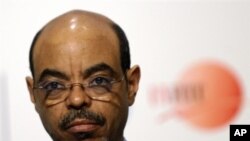A three-day conference that focused on good governance, peace and security as well as sustainable development in Ethiopia and the Horn of Africa ended over the weekend in Arlington, Virginia.
Aklog Birara, a senior advisor at the World Bank and an organizer of the conference, said it was a soul-searching conference, adding that Ethiopia’s future and that of the Horn of Africa will largely depend on the talent pool of experts in the Diaspora.
“One of the features that really attracted me is the fact that it [conference] drew a cross-section of experts -- foreign experts, Europeans, Americans, Ethiopians, and Ethiopian-Americans from different backgrounds. Overall, there were more than 70 speakers on different topics,” he said.
The conference organized by Advocacy for Ethiopia (AFE) and the Ethiopian National Priorities Consultative Process attracted specialists, former diplomats, human rights activists, and scholars, as well as top officials of the international community.
Birara said the conference also focused on how countrymen living abroad can help improve the lives of Ethiopians back home.
“The focus was on Ethiopia, the Ethiopian people, and the Horn of Africa particularly. What is it that all of us can do that will make a difference in terms of the ordinary people in Ethiopia. What is it that we can provide in terms of really engendering hope (and) aspiration. Bridging relations, for example, across ideological and ethnic lines,” Birara said.
The organizers believe that development in Ethiopia, the stability and its viability, as well as peace and economic development in the region are tied to how Addis Ababa and the international donor community can work together to address previously unmet challenges.
They also said the stakes for Ethiopia and its population of 83 million people are higher than at any other time in its history.
Birara said unity and dialogue among Ethiopians could help rebuilding efforts.
“One of the areas that we tried to explore was we can’t just be constant critics. How is it that we can bridge relationships in order to contribute our part at least in building durable, strong-pluralized institutions in Ethiopia? I think the fact is that we do not reach out to one another across ethnic lines. Dialogue among us, you know. And also dialogue between the opposition parties and government. We need to really accentuate the reaching out,” Birara said.
He added that if Ethiopians fail to come together, the challenges facing the country will persist.




